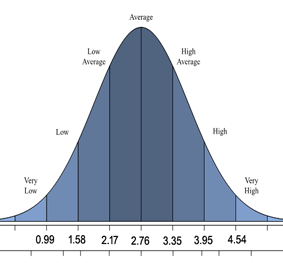According to the CIA Factbook for 2010 the per capita income of Qatar is a staggering $179,000 per year. Not far behind, Lichtenstein comes in at $141,100. The US is $47,200, and the UK is $34, 800. At the bottom of the income pyramid we have Burundi and the Democratic Republic of the Congo at $300 per year. Pirate infested Somalia comes in at $600/year. Over 70 countries have per capita incomes of less than $5000 per year.
Some economies are flourishing, some are not. Why?
IQ wealth and cognitive capital
There are many factors that make a difference of course – including economic freedom, natural resources, trade-relations, and so on. In the last 50 years or so, economists have started taking an interest in the value of human capital – sometimes called social capital: that is, the qualities of the people who make up the workforce. Heiner Rindermann, of the Chemnitz University of Technology, wanted to look more closely at one aspect of human capital – which may be called cognitive capital: the individuals cognitive ability:
In other words, it’s the ability of a person to solve a problem in the most efficient way — not with violence, but by thinking.
A study co-authored with James Thompson of University College London, shortly to be published Psychological Science, Rindermann has demonstrated a strong IQ-wealth link. Researchers analyzed IQ test scores from 90 countries and found that the intelligence of the people – especially the smartest 5 percent – made a big contribution to the strength of their economies.
What does IQ Mean? 1 IQ Point = $468 per year for the smartest
For each one-point increase in a country’s average IQ, the per capita gross domestic product (GDP) was $229 higher. For the smartest 5% of the population in each country – the cognitive elites – it made an even more dramatic difference to salary: for every additional IQ point in that group, a country’s per capita GDP was $468 higher. In other words, the IQ level of Lichtenstein’s cognitive elite is much, much higher than the IQ level of Burundi’s cognitive elite.
125-130 IQ – Cognitive elites
In the US, UK, Australia, Europe and other western countries, assuming an average population IQ of 100, the data indicates that individuals with a 130 IQ – putting you in the top 2.3% of the population – are powerful wealth creators. An IQ of 125 puts you in the top 5% – a member of your society’s cognitive elite!
Why the IQ-wealth link? What does IQ mean?
Why is the level of the most intelligent people important for economic productivity? Rindermann offers the following explanation:
IQ is relevant for technological progress, for innovation, for leading a nation, for leading organizations, as entrepreneurs, and so on.
To quote from the article’s abstract:
this group’s cognitive ability predicts the quality of economic and political institutions, which further determines the economic affluence of the nation.
According to Rindermann, cognitive capital is the major determiner of economic productivity – more important than economic freedom itself.
I think in the modern economy, human capital and cognitive ability are more important than economic freedom.
References
H. Rindermann, J. Thompson. Cognitive Capitalism: The Effect of Cognitive Ability on Wealth, as Mediated Through Scientific Achievement and Economic Freedom. Psychological Science, 2011; 22 (6): 754 DOI: 10.1177/0956797611407207
A related book is:
IQ and the Wealth of Nations (2002). This is a book by Dr. Richard Lynn, Professor Emeritus of Psychology at the University of Ulster, Northern Ireland, and Dr. Tatu Vanhanen, Professor Emeritus of Political Science at the University of Tampere, Tampere, Finland. The book argues that differences in national income (in the form of per capita gross domestic product) correlate with differences in the average national intelligence quotient (IQ). The authors further argue that differences in average national IQs is one important factor, but not the only one, contributing to differences in national wealth and rates of economic growth.
..



Comments are closed.